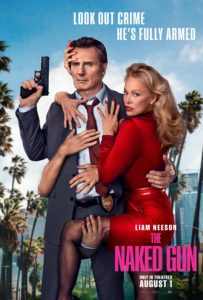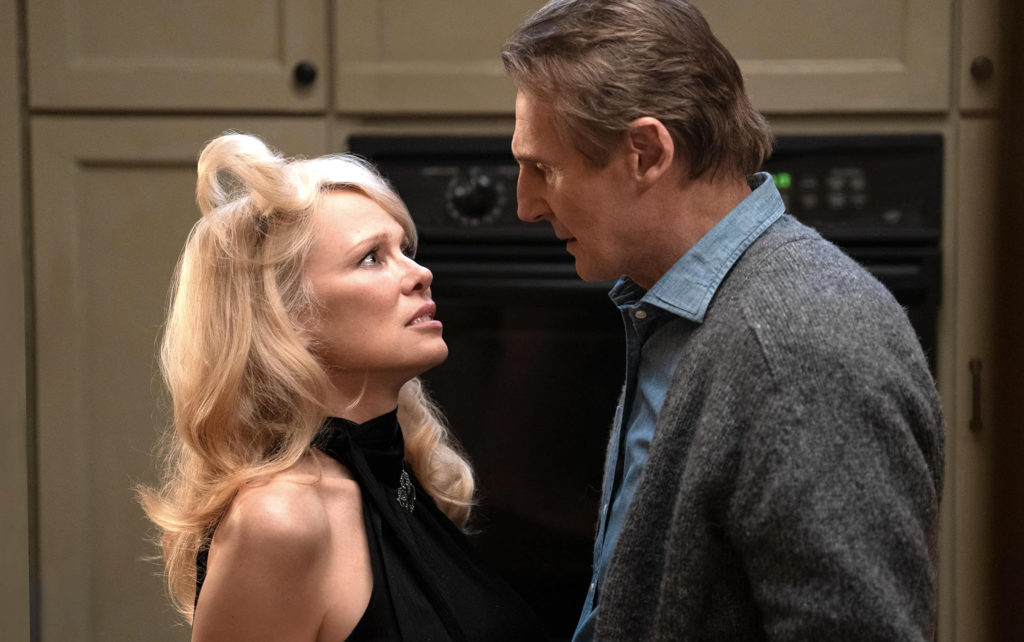The late comedian Norm Macdonald was once asked if he agreed that stand-up comics were modern day philosophers.
“Well, that just makes me sad for the actual modern-day philosophers,” was his conclusion. Comedy can be intelligent, as Norm himself proved, but when the wittiest bon mot pales in comparison to a man getting hit below the belt, it pays to be humble.
“The Naked Gun,” a reboot of the 1988 classic and released in theaters Aug. 1, is one of the funniest theatrical comedies in recent memory because it understands this so well. Its contemporaries have experienced mission drift, losing sight of humor to instead make you feel or, God forbid, learn. They can feel that shudder down my spine all the way in Calabasas. “The Naked Gun” does its predecessor proud by having no pride, never letting things like ego or dignity get in the way of making you laugh.
The movie takes a buckshot approach to comedy, throwing so many jokes at the wall that even if some miss, it will find its target at least once a minute. It deploys jokes, puns, reheated Borscht Belt one-liners, even flatulence if all else fails. These gags rarely fail, so the noble gas is often included for its own righteous sake. The jokes are also, blessedly, jokes. The recent modus operandi of comedy films has been to keep the cameras rolling and the actors riffing, compiling the best improvisations. This results in comedy that feels formless, a jam session where the joke is ultimately on you. Even the stupidest jokes here are constructed, putting pen to paper to find the proper way of getting dog excrement onto the heel.
There’s humor even in the casting. Liam Neeson takes over for the late, great Leslie Nielsen. Neeson plays Detective Frank Drebin Jr., son of Nielsen and Priscilla Presley of the previous “Naked Gun” (the movie never comments on the fact that Neeson is only seven years younger than his supposed mother, so we must declare it another gag).

Unlike many actors fresh to comedy, Neeson has the wisdom to play it entirely straight, sending up his action star persona by not changing an iota of it. He growls his puns with the same gravitas he used to browbeat Frenchmen into returning his daughter. The whole movie rests on him never winking.
Drebin (Neeson) is a detective in Police Squad, an elite department of the LAPD. Like so many detective stories he soon finds that two different cases are in some way connected, one involving the robbery of a high-priced piece of technology (helpfully titled the P.L.O.T device), the other a death in a suspicious car crash. The dead man’s boss, tech mogul Richard Cane (Danny Huston) wants it all to go away quietly, while the dead man’s sister (Pamela Anderson) wants answers, and maybe Drebin too if screentime permits.
For all my preamble about how this movie prioritizes humor over message, there is one lurking if you sift through the scatologies. A friend pointed out to me how this is a surprisingly old cast for a blockbuster. In the film, they play characters struggling to adapt to modernity: Drebin is bamboozled by body cams and driverless cars, while Cane hates the brave new world he helped create. His own solution is a nefarious scheme to wipe the slate clean, while Drebin, befuddled as always, would rather win hearts to the old school than stop them cold.
The age of the characters, and our long history with the actors, adds something to the experience. We’ve been cracking jokes about old man Neeson in action flicks for almost 20 years — but now we look up and are startled to find he truly is an old man. The wrinkles and the twinkle in his eye do much to blunt the outrageousness of 90% of his dialogue.
Then there is Pamela Anderson, whose reputation for the last 30 years would keep her out of a Catholic magazine. But then again, the years breed familiarity, and in Anderson’s case, they have also brought a healthy level of introspection about some of her life choices. In any case, I found myself delighted by her and her performance. A couple decades on from Baywatch and she’s finally found her proper niche.
Every once in a while, I remember that my primary audience in these pages include esteemed members of the clergy, and the devout mothers of all my friends. Thinking about “The Naked Gun,” I wondered how I could justify endorsing a film of such wanton, even gratuitous bad taste.
Thankfully, Catholics have a maneuver around this conundrum: to call the offending material Chaucerian. The 14th-century English writer Geoffrey Chaucer was a good Catholic and also a total vulgarian, and he provides the edifying gloss that allows one to laugh at a good old-fashioned dirty joke. So you heard it here first: “The Naked Gun” is our generation’s equivalent of “The Canterbury Tales.”

